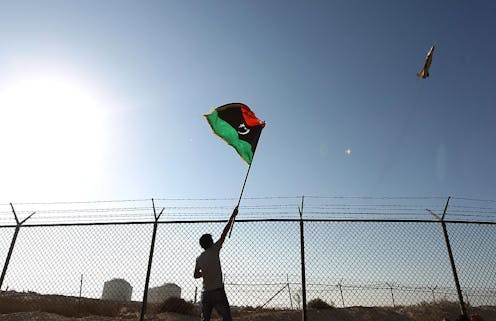
Two days before Libyans were to go to the ballots for a new interim president on December 24, the country’s election officials finally admitted what had become obvious: the first-round vote would not take place. Citing legal, logistical and security issues, the officials proposed a new date one month later to coincide with already-postponed legislative elections.
Since then, all preparations have ground to a halt. UN mediators are now hoping to build a domestic and international consensus for June elections.
The December vote would have coincided with country’s 1951 independence date. Its aim was to bookend an internationally led peace process by electing a new interim government acceptable to a majority of Libyans. This peace process succeeded in late 2020 in ending — for the time being — much of the fighting in Libya’s seven-year civil war. But it has done little to reconcile the main warring factions.
Whether elections will be able to seal the breach in the Libyan polity remains an open question. Two leading observers of the Libyan crisis argued in early December that the proposed elections would likely perpetuate the conflict by simply shifting the terrain of struggle from military operations to political institutions.
Libya’s current civil war emerged in 2014 following divisive elections for a new interim authority. In the wake of the 2011 armed uprising that ousted the longstanding regime of Muammar Gaddafi, the political, economic, and security challenges confronting Libya’s transitional leaders proliferated beyond their control.
Terrorism had taken root, particularly in the east, while militias of all political stripes laid claim to key state assets and institutions. Meanwhile, the country was riven by ideological differences over the role of former regime officials and the extent to which the aim of the 2011 revolution was to radically transform Libyan society.
The leading candidates
The prospect of presidential elections in Libya is further clouded by the controversies that surround the leading candidates.
Saif Al-Islam Al-Gaddafi: One of the surviving sons of the slain dictator, is the most infamous of the candidates. His primary constituency appears to be Libyans who long for the stability of the Gaddafi era, if not a return of the political and economic advantages some groups obtained under the old regime.
Many other Libyans, however, think Saif Al-Islam should be tried for crimes against humanity or sent to the International Criminal Court — where there is an open warrant for his arrest — for his role in suppressing the 2011 uprising.
Khalifa Haftar: Haftar is commander of a coalition of armed groups with control over eastern Libya and most of the Saharan interior. A desire for security appears to be driving support for him. While Haftar won backing from many Libyans for ending much of the violence that had been destabilising eastern Libya, his efforts to gain power militarily, including a failed campaign to take the capital Tripoli in 2019-2020, have fed reasonable suspicions that he would become a national-security dictator along the lines of Egyptian president Abdel Fattah el-Sisi.
Prime Minister Abdul Hamid Dbeibeh: The head of Libya’s current transitional authority, the Government of National Unity, has also thrown his hat into the ring. This is despite having sworn he would not seek the presidency after serving as interim head of state. Critics of Dbeibeh, who has a business background, believe that he has been using his control over government spending to build support for his presidential bid.
There are dozens others who registered interest in the presidential ballot. The common problem is the extent to which they are unacceptable to large numbers of Libyans. The real crisis facing the elections in December was not just which candidate would win but whether all or enough Libyans would recognise the outcome.
Peaceful endgame
An equivocal election in 2014 was marred by low turnout and implacable spoilers. This is precisely what triggered Libya’s descent in civil war seven years ago.
The predicament now facing the UN peace process in Libya is how to transform the current situation into a peaceful endgame. A resumption of large-scale armed hostilities is a possibility but seems unlikely.
The are four main external powers backing both sides. Turkey supports the side of Tripoli-based authorities. On the other hand, Russia, Egypt and the UAE back Haftar. Both sides have realised the impossibility of a military solution for the time being.
Moreover, the Libyan people, including many of its armed forces, have been exhausted by over a decade of on-and-off fighting. And their country is worse off now than it was at the start of the 2011 revolution.
Libyan technocrats are working to keep the oil flowing. They are also working to deliver reliable governmental services to their constituents. What the United Nations has so far failed to do is develop a formula for addressing the formidable power that armed spoilers and dominant personalities have accrued during Libya’s interminable political interregnum.
Jacob Mundy has received funding from the American Institute for Maghrib Studies, the US Fulbright Program, and the Project on Middle East Political Science. He is a visiting fellow at the European Council on Foreign Relations.
This article was originally published on The Conversation. Read the original article.







